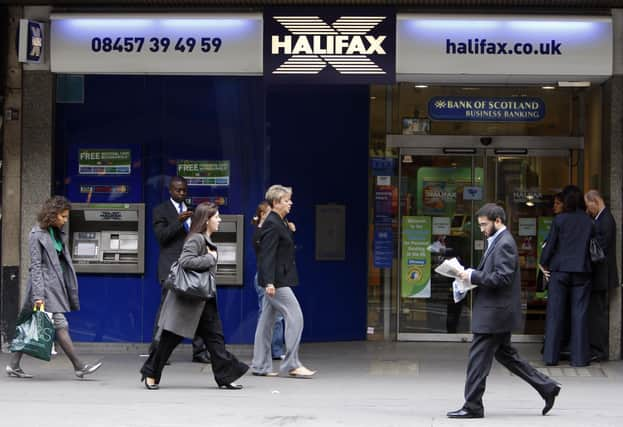20 years on, how seeds of the credit crunch were planted in Halifax


It was, as history eventually demonstrated, a marriage made in hell. But the merger 20 years ago of Britain’s biggest mortgage lender with Scotland’s oldest bank was hailed at the time as “a new force in banking”.
On their first day of trading, shares in the merged HBOS bucked the market trend and by lunchtime had risen by 6.5p – buoyed by advice from one analyst that they were “a safe bet for those with nervous dispositions”.
Advertisement
Hide AdAdvertisement
Hide AdThe expert in question was later to eat his words, especially when he added that the bank ran “less risk of bad debt in an economic slowdown”.


The Bank of Scotland had tried unsuccessfully to merge with NatWest and Abbey National before it threw in its lot with the Yorkshire-based Halifax, the huge former mutual building society that had expanded exponentially since the 1986 Building Societies Act ushered in a more relaxed regulatory regime.
With the benefit of two decades of hindsight, it was a harbinger of the credit crunch and the collapse of the banking system to come.
Six years after the merger, the combined HBOS plc collapsed under the weight of its liabilities. Laden with bad mortgages it was taken over by Lloyds, and a month after that the Government was forced to inject £20bn of public money to keep it afloat. The official Bank of England report on the collapse blamed the bank’s directors – who, it said, “lacked sufficient experience and knowledge of banking” – and the regulator, the Financial Services Authority, for failing to appreciate the extent of the risks HBOS was running.
Advertisement
Hide AdAdvertisement
Hide AdThe clues were there much earlier, said Professor Alper Kara, of Huddersfield University’s Business School. The problem was that no-one chose to see them.
“It was a recipe for disaster. Since 2004 there had been a climate of risk taking, but it was common in every bank. What the financial crisis eventually showed was that some banks were more reliant than others on financing their liabilities with more short term funding.”
Neither the regulator nor even the banks fully understood the risks they were taking, said Prof Kara, a former European bank trader who is now also associate editor of the European Journal of Finance,
His own bank in Istanbul was dealing in bonds that were hard to track even by its own auditors.
Advertisement
Hide AdAdvertisement
Hide Ad“The banks knew the risks they were taking at some level but they didn’t appreciate the extent to which all the markets were interconnected, And the regulators didn’t fully understand the risks at all.
“But if you’re a banker what you’re thinking about is this year’s bonus and then next year’s bonus.”
Not only the traders but also the customers were making hay, as mortgages were scattered like confetti among borrowers who were unlikely to be able to keep up the payments.
“Banks lent to people they shouldn’t have done, especially in the US,” said Prod Kara. “That’s basic banking – you need to know who you’re lending to if you want the money back.
Advertisement
Hide AdAdvertisement
Hide Ad“But no-one was complaining about suddenly being able to buy a house or a car that they couldn’t afford before.”
The 2001 Halifax-Bank of Scotland merger may be seen now as sowing the seeds of destruction but at the time it was one deal among many, he said.
“Halifax was big in mortgage lending, and the Bank of Scotland was looking for a big customer base it could exploit in selling other products. So it became a universal bank that did everything. That was quite common, but when you create these huge financial institutions it makes it hard for the regulators to see inside.”
It was only after the collapse that investigators were able to report that of 12 non-executive directors on the board at HBOS, only one had a background in banking. Even the chief executive had only limited experience.
Advertisement
Hide AdAdvertisement
Hide AdAs a result, the consequences of complex trading that saw thousands of bad mortgages bundled into bonds and traded amongst banks were not fully appreciated.
“Because it happened in the heart of the financial system it dragged down the rest of the system and the economy with it,” Prof Kara said.
It was not until 2017 that taxpayers recovered the money used to bail out the Lloyds Banking Group, and the aftershock from the collapse continues to reverberate, with many banks accelerating their closure of high street branches as they attempt to compensate for their reduced margins.
“Banking is not the profitable business it was,” said Prof Kara.
Advertisement
Hide AdAdvertisement
Hide AdThe Bank of England report on the collapse of HBOS blamed its board for having “failed to instil a culture within the firm that balanced risk and return appropriately, and lacked sufficient experience and knowledge of banking”.
The directors were concerned more with increasing their market share and with short-term profitability than with addressing “inherent vulnerabilities” with its “flawed and unbalanced” strategies, it said.
And contrary to the conventional wisdom on the day in 2001 when it made its stock market debut, the weaknesses in its balance sheet made it “extremely vulnerable to market shocks and ultimately failure as the crisis of the financial system intensified”.
Support The Yorkshire Post and become a subscriber today. Your subscription will help us to continue to bring quality news to the people of Yorkshire. In return, you’ll see fewer ads on site, get free access to our app and receive exclusive members-only offers. Click here to subscribe.
Comment Guidelines
National World encourages reader discussion on our stories. User feedback, insights and back-and-forth exchanges add a rich layer of context to reporting. Please review our Community Guidelines before commenting.